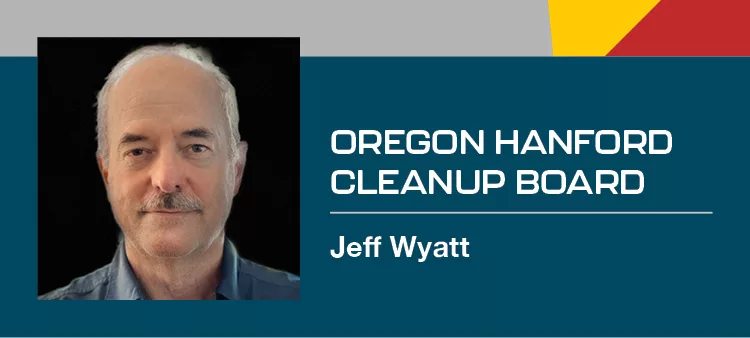
Home » Protecting Columbia River ecosystem is highest priority
Protecting Columbia River ecosystem is highest priority

April 13, 2023
The largest environmental cleanup in the western hemisphere is located at Hanford north of Oregon on the Columbia River. The processes that produced the plutonium used in America’s nuclear weapons program resulted in the disposal of vast quantities of radioactive and chemical waste at the site, and historic releases to the Columbia River and the Pacific Northwest’s air.
Today, the U.S. Department of Energy (DOE) is midway through a century-long cleanup of Hanford which will cost hundreds of billions of dollars. The pace of the cleanup, its cost and effectiveness are a critical concern to the residents and taxpayers of Oregon, as is our highest priority for cleanup actions at the site – the protection of the Columbia River.
The Oregon Hanford Cleanup Board is a state-appointed board with a mission to ensure that the cleanup of the Hanford site is conducted in a way that protects the environment, safeguards public health and safety, and promotes economic vitality in the region.
The board’s members include representatives from the state Legislature, the Confederated Tribes of the Umatilla Indian Reservation, industry, academia and public interest groups.
Members serve three-year terms and are chosen for their expertise in areas such as environmental science, public health, engineering and community affairs. Members of the public are appointed by the governor of Oregon.
Together with the Oregon Department of Energy, the board meets regularly to review progress, identify issues and make recommendations to ensure that the cleanup is conducted in a manner that is safe, effective and sustainable for the long term.
The board also works closely with DOE, the Environmental Protection Agency and the Washington State Department of Ecology to provide advice on the cleanup of the Hanford site.
Oregon’s representatives recognize the vital importance of the health of the Columbia River ecosystem, including the recreational and commercial fisheries in the Columbia River and the Pacific Ocean.
The Hanford site, with its proximity to the river, has the potential to impact these fisheries, which are critical to the economy and the cultural heritage of the region.
Although the river flows downstream to the Pacific, migrating steelhead and salmon move back upstream into tributaries and streams across Oregon.
Any activity or pollution in the Columbia River has the potential to impact most of Oregon’s major rivers including the Snake, John Day, Deschutes, Owyhee and Willamette.
And we are mindful that the interests and concerns of the Native American tribes in the region who have deep cultural and historical ties to the land are linked to the health of this larger Columbia River ecosystem.
In addition to its environmental and cultural significance, the Hanford site is also a major economic driver in both Washington state and northeast Oregon.
The site employs thousands of workers and supports a vast network of local businesses and industries, providing much-needed economic stability to the region.
Oregon is committed to working with stakeholders to ensure that the cleanup is conducted in a way that maximizes the benefits to the regional economy and minimizes any potential negative impacts.
The health and safety of the workers at Hanford and residents for hundreds of miles around depends on sufficient funding and competent management of the cleanup.
Oregon strongly supports the permanent removal of high-level nuclear and transuranic waste from Hanford to ensure the long-term safety of the environment and the surrounding communities.
Most of this waste will eventually be transported across the state of Oregon, and it is imperative that it is done safely with all due precautions in place to prevent and, if needed, respond to accidents or releases. Where this high-level waste will eventually go is an open question.
The Oregon Hanford Cleanup Board encourages all Hanford stakeholders to work with the federal government to identify and develop a permanent geologic depository for Hanford’s legacy nuclear waste.
The Oregon Hanford Cleanup Board emphasizes the need for collaborative efforts from all stakeholders to achieve a successful cleanup of the Hanford site.
To accomplish the mission of the cleanup in a safe, effective, and timely manner and protect the Columbia River for future generations, it is imperative that the agencies meet their agreed-upon milestones and secure necessary funding from Congress.
We acknowledge that the cleanup of Hanford is complex and challenging work, which requires significant financial resources from U.S. taxpayers. We will continue to urge Oregon’s congressional delegation to increase funding for the Hanford cleanup to a level that is expected to be necessary to complete the cleanup mission on schedule, to ensure that this vital work can continue without delay.
Jeff Wyatt is chair of the Oregon Hanford Cleanup Board.
Hanford
KEYWORDS april 2023





